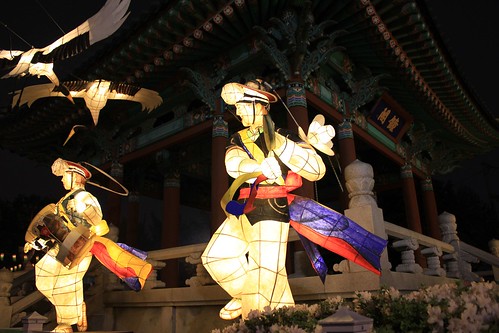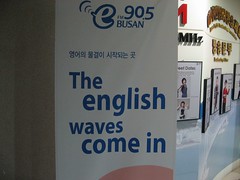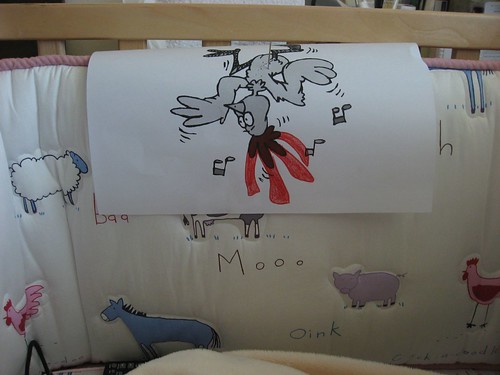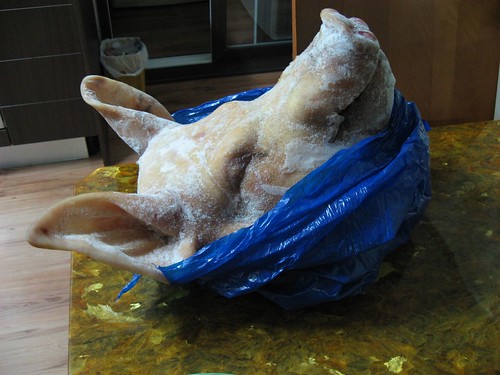The failure to go to England had another consequence. Our son would celebrate his first birthday in Korea. So we had four options in order of my descending preference: do nothing, have a meal with friends and family at home, have a meal with friends and family in a restaurant, or submit to the complete circus that is a baby birthday hall. Yes, they have baby birthday halls.
Tired, sick, rejected from a job I wanted, and generally extremely fed-up, when my wife broached the subject with me, I famously said “just choose the option you think best”. Tens of thousands of years of language development and men still haven’t learned not to speak those words in sequence to women. I suppose one would have to conclude at this point that it must serve some evolutionary purpose, but if it does I certainly can’t imagine what. And I said it in Korea.
So the baby birthday hall it was then, with all the consequences stemming from this that you don’t clearly think through until they are making your life a misery, such as the one-year photo shoot, the video, the invites, the hanboks, and the breakdancing.
The Photo/Video Presentation
Yes, it is not so simple as booking a time, sending out some invites and just turning up, because the first thing you’re going to need is to arrange the video and photo presentation that forms one of the centrepieces of the birthday celebration. Now in all probability you’ve spent the last year taking copious amounts of photos and videos of your baby – this is Korea after all - so you might be led to believe that these would prove sufficient, but nay, nay and thrice nay.
The photo presentation must contain pictures from the one-year photo shoot – it’s the law – so this involved another trip to a self-studio, a lot of silly hats, and an understanding wife. Understanding because just before we were about to set off for said studio, I received an email telling me I hadn’t got an interview
for the job I wanted, so I spent twenty minutes writing a reply trying to persuade them to change their minds (they did), and telling them I’d go there immediately if they wanted to interview me that afternoon, which would cause us to miss the shoot (I ended up going the next morning). We were late arriving at the studio, but they didn’t have another booking after us, so they let us run over, which was pretty decent of them.
So we now had our full portfolio of photographs and videos, but they had to be packaged in a proper presentation format, because well... everyone else does and so like most things in Korea, it’s something of a social arms race.
There are one-and-a-half ways of doing this. Either have a specialist company produce one for around 70,000 won, or go down the cheaper road of doing it yourself. Well, we’re all into self-empowerment here at Busan Mike Inc. (i.e. we’re cheap), so we did it ourselves. And it can be both fun and therapeutic too. Once I’d produced an outline photo and video montage and a credits sequence where I was only listed under
Professional White Guy as ‘Dada’ and which ended with the phase
“No Piracy in Korea!” I really began to see the possibilities for indulging in a little satire for the purposes of self-therapy. It would have been lost on the audience of course, in fact there’s every chance they might have viewed the result positively as taking the process into a ‘new paradigm’, but sadly it was not to be. I
became too sick to work on it any further and my wife did it instead. But I’m sorry my baby video as a parody of “Korea’s Got Talent!” never saw the light of day.
My wife’s video-photo montage was more conventional, and perhaps the Windows Live Movie Maker produced result was not as polished as the professionally produced videos we’ve seen at other first-birthdays recently, but on the other hand my wife also speaks English well-enough to know not to choose a soundtrack with the lyrics “ooh, my ass, my ass, my sexy ass” to accompany those videos of baby crawling around. It’s possible the singer was intending some action to be performed in relation to her ass, but I never did decipher those lyrics, and perhaps it’s just as well. Meanwhile, one of the English captions read “Let is wet the baby is head” and since it appeared at a point devoid of head wetting, its purpose and that of several other captions will remain a mystery.
Of course the other problem with burning a DVD is who does that any more? We had to go out and find a disc that was compatible with our computers and their DVD player, because you really only have one shot at this.
Hanbok
The next problem, if indeed it isn’t actually several problems further down the road, is that you need a
hanbok, Korea’s traditional dress and method of ensuring that you take up twice the physical amount of space you would otherwise need. For some inexplicable reason, hanbok have failed to sweep the world to the extent that even Koreans don’t normally wear them or own them these days. So a trip to the hanbok-hire store is in order so that you, your spouse and your child can pick out matching hanbok. Matching is a strong word because in my experience many hanbok are something of a conflict of colour which rarely match themselves let alone anything else, but in the end we pick the ‘Microsoft Office’ hanboks which limit themselves to pale blue and white. They even have ribbons as well, though it’s unclear if anyone wants them.
It has taken us some time to reach this point however, because the small branch office of the hanbok-hire company located in the baby hall building has a very limited selection so we have to visit their headquarters, which much like those descriptions in Korea’s traditional fairy stories is “‘five minutes walk’ from a subway station in a land far, far away.” Which means more time wasted. Sorry, I mean more time usefully spent in subway trains with a crying baby.
But I am relieved to discover that on this occasion, the hanbok I have to wear does not include a
square metal belt and badly fitting
Wellington boots. And this is fortunate, because by attending other baby birthday parties recently I have discovered that it is customary in Korea to call upon the father to engage in the traditional Korean dance form known as ‘hip-hop’, ‘breakdancing’ or ‘b-boying’.
Can You Breakdance (in a Hanbok)?
“I’m the MC” announces a disturbingly wild-eyed youth who comes up to me at the start of proceedings – or at least as close as he can given my hanbok-exclusion zone. Except phonetically he says Em-Shi because Koreans pronounce ‘Ci’ as ‘Shi’ which is why Centum City is potentially such an immaturely amusing place to live. “Ah, Em-Shi-shi”, I greet him using the polite formal suffix for personal names, but it’s lost on him. “Can you breakdance?” he obliviously continues. I am wearing a large hanbok and after one year of being a parent I have the physical appearance of an 80 year-old. The correct response would have been a withering “Do I
look like I can breakdance?”, but the best I can manage is “No.” One day, my language abilities will be good enough for my personality to escape its prison, and then the Koreans will hunt it down and kill it.
So he tells me to just copy him when the time comes, because obviously the only alternative is to go with my own routine that helped my crew win the
R-16 Battle three years in a row, although we weren’t wearing hanbok at the time. I promise you that hanbok breakdancing
will be the next big thing though. I might even email it in as a suggestion to the Ministry of Culture. They’ll go for it as well. You know it. I know it.
Guests or No Guests
So the guests arrive. I feel this requires mentioning explicitly since for the first 20 minutes, when nobody came, it didn’t appear to be a given. I was once setting up a meeting with some African-Carribean student leaders and their constituency, and they told me we’d meet at 8pm, which meant 9, “it’s a cultural thing” they explained. As a person who’s always been driven by each tick of the clock I admired that about them. Koreans are not always so unpunctual in my experience, but with our baby’s birthday and those of the other people’s we attended, people tended to drift over an extended period of time rather than actually turn up when you expect them.
To be fair, it’s not like anything particularly urgent is scheduled, and perhaps that’s why. These birthday baby halls are much like wedding halls insofar as food is organised around a extended buffet layout, with side rooms leading off from this central area. The prepared baby video plays on a loop in the room for around an hour, until the MC turns up for his 15 minute entertainment slot. In the meantime, guests come along, bringing their envelopes of gift money, which has largely replaced
the old tradition of giving gold rings. In fact to some, the money is the most important part of the proceedings because before this point, an equation has been carefully calculated and much like an exam, this is when you get your answer.
P=(Gi*(Ga/100))-H-S-(R*i)-[(Ajeossis*Bottles)]
The equation is highly complex and normally requires several hours of supercomputer time to complete, or your Korean mother-in-law. Grossly simplified, the number of guests invited is divided by the ratio of guests likely to come, the costs of the wedding hall, per-guest buffet charge, hanbok hire and sundry expenses, versus the amount of gift money the guests are likely to bring (which is usually more than cost per head), plus the likelihood that these said guests will retaliate by subsequently inviting you to one of their baby or grandchild parties, which negates the financial advantage of inviting them given that you will, essentially, then have to return their gift money. There are many further sub-equations, such as the table-bottle amplification, which calculates the additional cost given that soft and hard bottled drinks are charged extra per bottle, and their consumption can rise exponentially if certain demographic critical masses occur, but they are beyond the scope of my explaining here.
Overall, the more people you can invite, the more likely it is you will see a profit. But one complication of being a foreigner is that I know very few people to invite, and even if all but one of them weren’t working on a live radio programme at the time of our party, the Korean gift-money system makes inviting your friends tantamount to asking for money from them.
Stress has been shown to be a major cause of health problems, so let me put your mind at ease now by revealing that we broke even on our baby party. We will probably end up running a small loss though as guests go on to have 20% more babies than us, according to our calculations.
Baby’s Future Career
So we reach the main event of the proceedings, which isn’t the hanbok breakdancing. After some gifts have been given out in faux-competitions by the MC, and more gift money has been begged for with a Catholic-church style collection tray, the collection tray, which has several other items within it, is presented to your baby for them to choose... their future career.
In the tray is a toy pencil (scholar), stethoscope (doctor), ball (sportsperson), hammer (judge), microphone (entertainer), mouse (dot-com millionaire) which alongside the recently donated and now untraceable cash (
Korean politician) provide you with your career options. But there had been a slight complication. A few days earlier our dog had torn the ball apart and it no longer existed, thus potentially changing the future course of our son’s life. Our son chose the pencil instead, which I suppose means my wife and I had better plan for our own retirement, and not expect our son to take care of us financially. Oh well.
Next there is a fake cake with a candle on top to light. The cake is made out of some kind of material which – this being Korea – is probably highly flammable, but despite this it appeared to have survived several dozen previous parties.
Hanbok Breakdancing
The potential conflagration was followed by the threatened hanbok breakdancing. By this time our MC had been temporarily joined by two accomplices who were evidently either professional breakdancers or were used to being electrocuted a lot and had memorised the moves. I readied myself for my inevitable invitation to join them in front of the crowd as I’d witnessed with previous fathers at baby birthday halls. But it didn’t happen. I think our MC let his lack of English get the better of his clinically extroverted personality, and he decided against it. It was a wise choice. Deprived of their entertainment, the guests gradually drifted away seemingly destined to not eat again for days afterwards.
The Undiscovered Country
When I was told that there was
a 100-day photo shoot for my baby, it came as a surprise because I wasn’t warned until the time arrived. The same is true for the 200-day photo shoot, and the one-year photo shoot. Similarly, the one-year birthday baby hall party had not been on my agenda. So I can not conclude this piece with a sense that I can put it behind me and consign the experience to history, because living in Korea is rather like the conquest of space – it’s a journey of exploration and you never know what you’re going to find next. Oh yes, and no-one really trusts the aliens.









